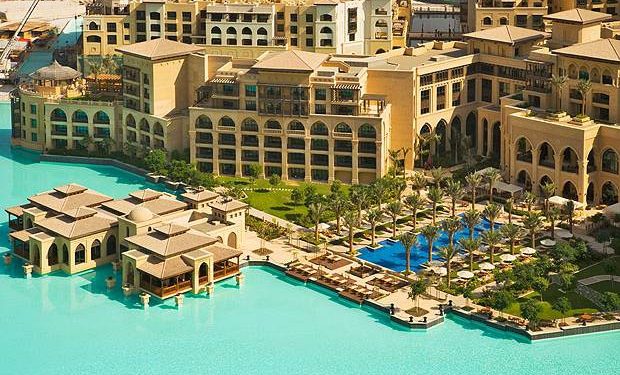Dubai has revived its growth forecasts in a sign of the indebted emirate's growing confidence in its nascent economic recovery.
Officials used a high-profile World Economic Forum meeting in Dubai to reaffirm growth targets that had been quietly shelved since the real estate crisis of 2008, when property values fell by up to two-thirds.
Dubai’s nominal gross domestic product will reach $133bn by 2015
The government says nominal gross domestic product will reach Dh490bn ($133bn) by 2015, up from Dh367bn in 2011, with the emirate averaging real growth of 4.5 to 5 per cent a year through 2015.
"Dubai's economy is well diversified and resilient to external as well as domestic shocks," Sami al-Qamzi, director-general of Dubai's department of economic development. "We think that growth will be more sustainable, albeit at a more moderate pace than in previous years."
Dubai's bullishness is reflected in the fact that these renewed forecasts outstrip projections made before the emirate's property bubble burst in 2008.
In 2007, the ruler Sheikh Mohammed bin Rashid Al Maktoum targeted a GDP of only $108bn for 2015.
It took more than $20bn in aid from Abu Dhabi to ward off a damaging default during the ensuing sovereign debt crisis
The economy, which had been growing at double-digit rates through the boom, was plunged into recession in 2009. It took more than $20bn in aid from the United Arab Emirates and its capital, Abu Dhabi, to ward off a damaging default during the ensuing sovereign debt crisis.
Dubai entities have since been successfully restructuring and refinancing their maturities, though concerns remain over the growing overdraft extended by state-controlled bank Emirates NBD to the government, which currently stands at around $19.7bn.
Dubai faces maturing loans of $48bn between 2014 and 2016, according to a recent research report by Standard Chartered Bank.
Confidence has swelled since the Arab spring restored Dubai's status as a regional haven
The emirate has made little progress in selling assets to pay off its debts, but thanks to this economic revival it is in better shape to deal with these obligations than in 2009, the bank says.
Confidence has swelled since the Arab spring restored Dubai's status as a regional haven, prompting a tourism revival, with arrivals up another 10 per cent in the first half of this year.
Mr Qamzi says traditional drivers of trade, tourism and transportation have now been followed by an incipient recovery in real estate and construction.
"We are starting to see encouraging evidence for this revival and the cranes are moving again – granted it's a bit slow but they are moving again and that is a good sign," he said.
Economists have noted that speculative activity is returning to the property sector as demand strengthens in some of the city's more popular residential districts
Economists have noted – with some alarm – that speculative activity is returning to the property sector as demand strengthens in some of the city's more popular residential districts, such as the area around the world's tallest tower, Burj Khalifa, and Palm Jumeirah, the man-made island jutting off the city's coastline.
A further recovery in the real estate sector would allow Dubai to return to its pre-2008 strategy of raising cash via land sales to deal with its overall debt mountain of $110bn.
Dubai is leading the charge within the seven member federation, with the UAE forecasting real growth of 3.5 to 4 per cent next year.
The economy minister, Sultan al-Mansoori, says the UAE is also introducing laws to boost investor confidence and better provide for its nationals, as the federation seeks to insulate the country against social unrest that has impacted most Gulf states.
The government will finalize a long-awaited companies' law, which will open up some sectors to 100 per cent foreign ownership
Mr Mansoori says the government should next year finalize a long-awaited companies' law, which will open up some sectors to 100 per cent foreign ownership.
The country is also working to improve bankruptcy legislation and improve education to allow its national population to contribute more to the private sector, which is dominated by the UAE's large expatriate population.
The Financial Times
15 November























































